What's Happening?
A United Nations assessment reveals that global efforts to reduce methane emissions are falling short, despite a pledge by 160 nations to cut emissions by 30% from 2020 levels by 2030. The report, released
during UN climate talks in Belém, Brazil, indicates that while methane emissions growth has slowed, they are still rising. The report calls for rapid action to meet the pledge, highlighting the need for more policies to contain emissions. Some leaders, including Barbados Prime Minister Mia Mottley, advocate for an international methane treaty, while others argue for immediate action without lengthy negotiations.
Why It's Important?
Methane is a potent greenhouse gas, and reducing its emissions is critical to controlling global temperature rise. The UN report underscores the urgency of addressing methane emissions to avoid critical climate tipping points. The call for a global methane treaty reflects the need for coordinated international action, but the debate over the best approach highlights challenges in balancing immediate action with long-term policy development. The report suggests that fulfilling existing pledges could significantly reduce emissions, but without further policies, emissions will continue to rise, impacting global climate goals.
What's Next?
Countries may need to implement more aggressive policies to meet the methane reduction pledge, including measures in the energy, agriculture, and waste sectors. The report suggests that achieving the pledge's goals would require significant investment but would yield substantial benefits, including reduced warming and economic gains. The push for a methane treaty could gain momentum, but immediate action is necessary to address emissions effectively. The outcome of the UN climate talks may influence future international climate policy and drive efforts to contain methane emissions.









